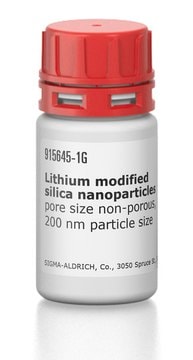914126
Silica nanoparticles
pore size non-porous, 300 nm particle size, 5 % (w/w) in water, dispersion
Synonym(s):
Monodisperse silicon dioxide, Non-porous silica, Non-porous silicon dioxide, Silica
About This Item
Recommended Products
form
dispersion
nanoparticles
Quality Level
concentration
5 % (w/w) in water
particle size
300 nm
pore size
non-porous
InChI
1S/O2Si/c1-3-2
InChI key
VYPSYNLAJGMNEJ-UHFFFAOYSA-N
Looking for similar products? Visit Product Comparison Guide
Related Categories
Application
Signal Word
Warning
Hazard Statements
Precautionary Statements
Hazard Classifications
STOT RE 2 Inhalation
Storage Class Code
12 - Non Combustible Liquids
WGK
WGK 2
Choose from one of the most recent versions:
Certificates of Analysis (COA)
Don't see the Right Version?
If you require a particular version, you can look up a specific certificate by the Lot or Batch number.
Already Own This Product?
Find documentation for the products that you have recently purchased in the Document Library.
Our team of scientists has experience in all areas of research including Life Science, Material Science, Chemical Synthesis, Chromatography, Analytical and many others.
Contact Technical Service



